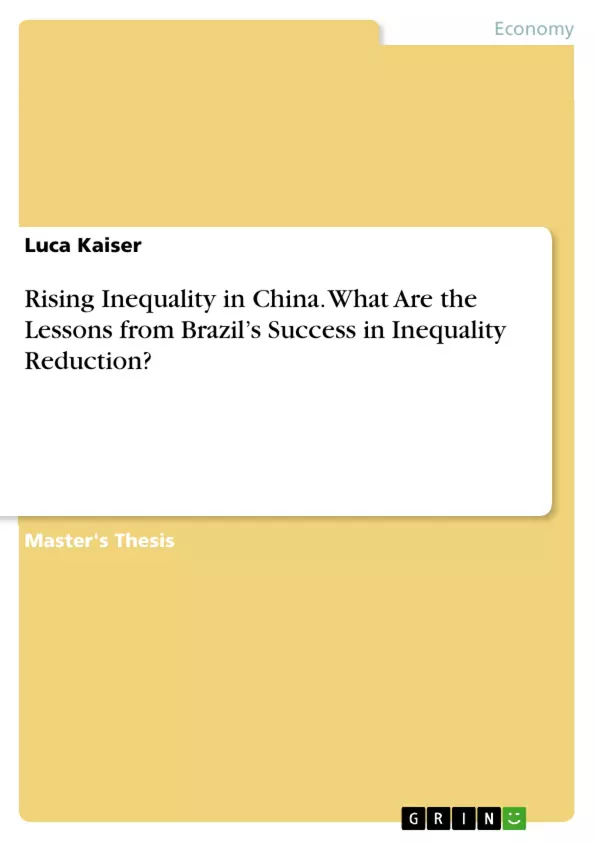This paper illustrates the main sources of income inequality in China and analyzes social policies and mechanisms that led to decreasing income inequality and pro-poor growth in Brazil in order to present lessons learnt for China to reduce income inequality. It explores how labor markets and social policies play a crucial role in directly or indirectly affecting inequality, suggesting a convergence of labor incomes through educational expansion and a constant rise of minimum wages, as well as effective non-contributory social assistance has contributed the most to the decline of income inequality in Brazil. These factors are evaluated not only from a monetary perspective but also from the perspective of people’s subjective wellbeing of enhanced capabilities and opportunities and its impact on social and economic development. This paper argues that Brazil’s experience offers solid policy recommendations for China to tackle rising income inequality and proposes interesting debates for social policy in China and other developing countries.
Inhaltsverzeichnis (Table of Contents)
- 1 Introduction
- 2 Inequality and Economic Development in China
- 2.1 Inequality on China's Political Agenda
- 2.2 Conclusion
- 3 Inequality Reduction in Brazil and Lessons for China
- 3.1 Inequality and Economic Development in Brazil
- 3.2 Convergence of Labor Incomes
- 3.2.1 Educational Expansion in Brazil
- 3.2.1.1 Education in China
- 3.2.1.2 Lessons for China
- 3.2.2 Raising Minimum Wages and Unemployment Benefits in Brazil
- 3.2.2.1 Minimum Wages and Unemployment Benefits in China
- 3.2.2.2 Lessons for China
- 3.3 Non-contributory Social Assistance
- 3.3.1 Conditional Cash Transfers in Brazil
- 3.3.1.1 Minimum Living Standard Guarantee Scheme in China
- 3.3.1.2 Lessons for China
- 3.3.1 Conditional Cash Transfers in Brazil
- 3.2.1 Educational Expansion in Brazil
- 4 Concluding Remarks
Zielsetzung und Themenschwerpunkte (Objectives and Key Themes)
This thesis aims to analyze the rising inequality in China and explore the lessons that can be learned from Brazil's successful efforts in reducing inequality. The thesis focuses on the convergence of labor incomes through education, raising minimum wages and unemployment benefits, and non-contributory social assistance.
- The impact of inequality on China's political and economic development
- The role of education, minimum wages, and social assistance in reducing inequality
- Lessons from Brazil's experience in inequality reduction that can be applied to China
- Policy recommendations for China to address rising inequality
- The implications of inequality for social and economic stability in China
Zusammenfassung der Kapitel (Chapter Summaries)
Chapter 1 provides an introduction to the topic of rising inequality in China and its impact on economic development. Chapter 2 discusses the political and economic context of inequality in China, highlighting its impact on various aspects of society. Chapter 3 examines Brazil's experience in reducing inequality, focusing on the convergence of labor incomes through education, minimum wages, and social assistance. The chapter then draws lessons from Brazil's success that can be applied to China. Chapter 4 concludes the thesis by summarizing the key findings and offering policy recommendations for China to address rising inequality.
Schlüsselwörter (Keywords)
The main keywords and focus topics of this thesis include inequality, economic development, China, Brazil, education, minimum wages, unemployment benefits, social assistance, non-contributory social transfers, and policy recommendations. The thesis explores the impact of these factors on inequality reduction and examines the lessons that can be learned from Brazil's experience.
Frequently Asked Questions
What are the main causes of income inequality in China?
Key sources include disparities between urban and rural areas, differences in access to education, and variations in regional economic development.
How did Brazil successfully reduce its income inequality?
Brazil achieved this through educational expansion, constant rises in minimum wages, and effective non-contributory social assistance like Conditional Cash Transfers.
What can China learn from Brazil's social policies?
China can benefit from expanding educational opportunities and strengthening social safety nets, such as improving the Minimum Living Standard Guarantee Scheme.
What is the role of minimum wages in inequality reduction?
Raising minimum wages directly boosts the income of the poorest workers, helping to narrow the gap between low and high earners in the labor market.
What is "pro-poor growth"?
It refers to economic growth that disproportionately benefits the poor, leading to a reduction in poverty and a more equitable distribution of wealth.
- Quote paper
- Luca Kaiser (Author), 2014, Rising Inequality in China. What Are the Lessons from Brazil’s Success in Inequality Reduction?, Munich, GRIN Verlag, https://www.grin.com/document/304464



